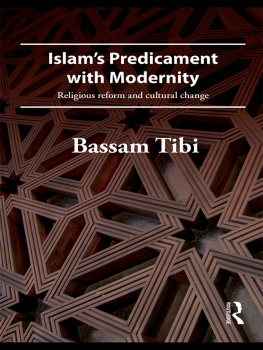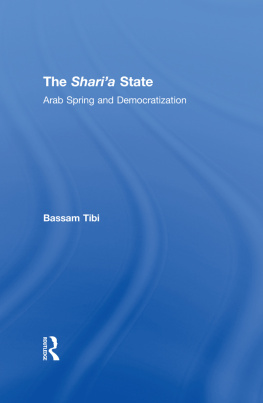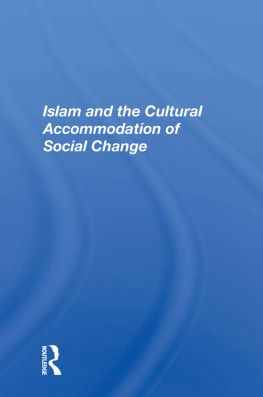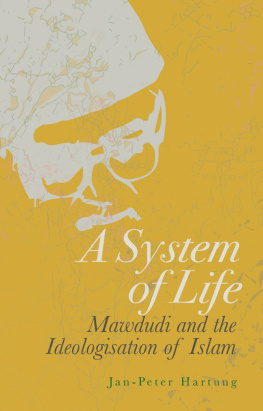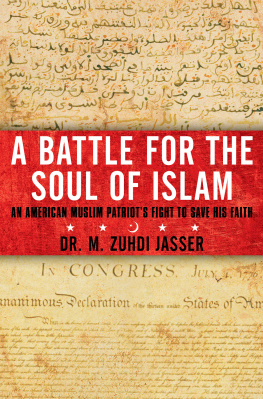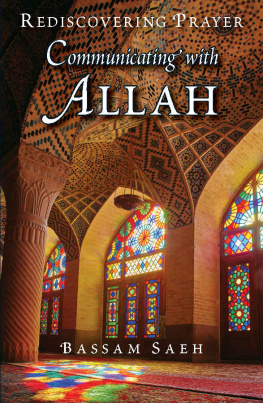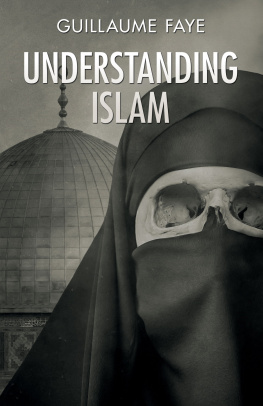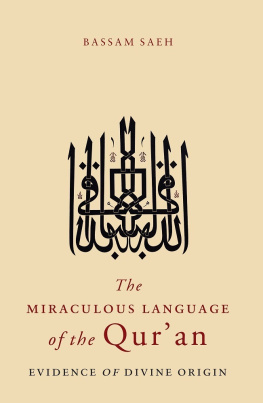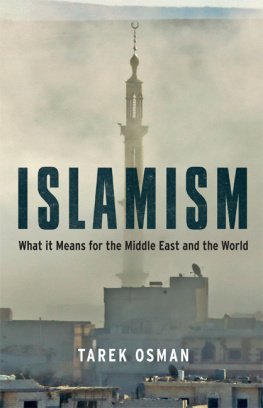Bassam Tibi - Islamism and Islam
Here you can read online Bassam Tibi - Islamism and Islam full text of the book (entire story) in english for free. Download pdf and epub, get meaning, cover and reviews about this ebook. year: 2012, publisher: YaleUP, genre: Politics. Description of the work, (preface) as well as reviews are available. Best literature library LitArk.com created for fans of good reading and offers a wide selection of genres:
Romance novel
Science fiction
Adventure
Detective
Science
History
Home and family
Prose
Art
Politics
Computer
Non-fiction
Religion
Business
Children
Humor
Choose a favorite category and find really read worthwhile books. Enjoy immersion in the world of imagination, feel the emotions of the characters or learn something new for yourself, make an fascinating discovery.

- Book:Islamism and Islam
- Author:
- Publisher:YaleUP
- Genre:
- Year:2012
- Rating:3 / 5
- Favourites:Add to favourites
- Your mark:
- 60
- 1
- 2
- 3
- 4
- 5
Islamism and Islam: summary, description and annotation
We offer to read an annotation, description, summary or preface (depends on what the author of the book "Islamism and Islam" wrote himself). If you haven't found the necessary information about the book — write in the comments, we will try to find it.
Islamism and Islam — read online for free the complete book (whole text) full work
Below is the text of the book, divided by pages. System saving the place of the last page read, allows you to conveniently read the book "Islamism and Islam" online for free, without having to search again every time where you left off. Put a bookmark, and you can go to the page where you finished reading at any time.
Font size:
Interval:
Bookmark:
Islamism and Islam
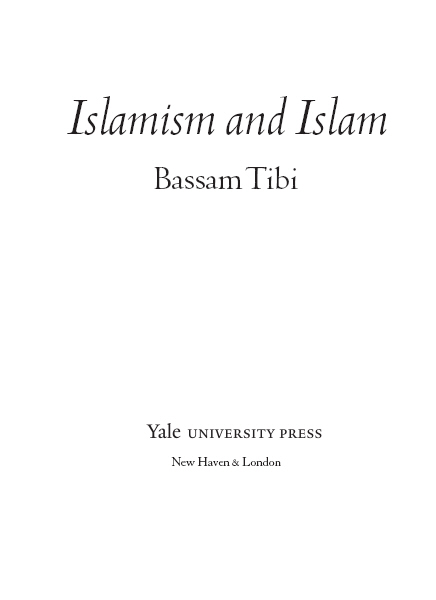
Copyright 2012 by Bassam Tibi.
All rights reserved.
This book may not be reproduced, in whole or in part, including illustrations, in any form (beyond that copying permitted by Sections 107 and 108 of the U.S. Copyright Law and except by reviewers for the public press), without written permission from the publishers.
Yale University Press books may be purchased in quantity for educational, business, or promotional use. For information, please e-mail sales.press@yale.edu (U.S. office) or sales@yaleup.co.uk (U.K. office).
Designed by James J. Johnson.
Set in Granjon type by Westchester Book Group.
Printed in the United States of America.
Library of Congress Cataloging-in-Publication Data
Tibi, Bassam.
Islamism and Islam / Bassam Tibi.
p. cm.
Includes bibliographical references and index.
ISBN 978-0-300-15998-1 (cloth : alk. paper) 1. Islam and world politics. 2. Islamic fundamentalism. 3. Islamic renewal. 4. Religious awakeningIslam. 5. Islam21st century. I. Title.
BP173.5.T534 2012
320.5'57dc23
2011037442
A catalogue record for this book is available from the British Library.
This paper meets the requirements of ANSI/NISO Z39.48-1992 (Permanence of Paper).
10 9 8 7 6 5 4 3 2 1
Contents
The first message of this book is that there is a distinction between the faith of Islam and the religionized politics of Islamism, which employs religious symbols for political ends. Many will deny this distinction, including most prominent Islamists themselves. There is no doubt that many Islamists hold the sincere conviction that their Islamism is the true Islam. In fact, however, Islamism emanates from a political interpretation of Islam: it is based not on the religious faith of Islam but on an ideological use of religion within the political realm. Islamism and Islam are thus different entities, not to be confused with each other, and in this book I aim to explain this difference.
In the field of Islamic studies, the difference between Islamism and Islam is largely ignored or even dismissed. But for reasons that will become clear, the distinction is crucial to any belief that Muslims can live in peace with non-Muslims. The religious faith of Islam is not an obstacle to peace or a threat to the non-Muslim other. Islamism, on the other hand, creates deep civilizational rifts between Muslims and non-Muslims. It not only labels Jews and crusaders as the enemy but also targets other non-Muslims: Hindus in Kashmir and Malaysia, Buddhists and Confucians in China and Southeast Asia, people of African animist religions in Sudan. Islamism classifies all non-Muslim people as kuffar infidelsand thus enemies of Islam. Liberal Muslims are not immune either. As well as contributing to polarization between Muslims and the non-Muslim other, Islamism also generates ferocious infighting within the community of Islam. In its jihad against enemies of Islam, Islamism seeks to excommunicate even liberal Muslims from the umma the worldwide Muslim community. To protect themselves against criticism, Islamists have invented the formula of Islamophobia to defame their critics. In contrast, in this book I combine respect for the faith of Islam with a staunch critique of Islamism. It is no contradiction to defend Islam against prejudice and to criticize Islamism.
Islamism is not what Islamic civilization needs today in its current state of crisis. Instead, we need to subscribe to a civil and liberal Islam with a secular perspective. In so doing, we non-Islamist Muslims not only approve pluralism but also seek a place for Islam in the diversity of cultures and religions that makes up the modern world. Liberal Muslims are not, as the journal Foreign Affairs characterizes us, a small slice. To describe us this way, with the implication that we may therefore be ignored, is not only a factual error but a tactical one, as this assumption tends to alienate precisely the non-Islamist secular Muslims who are most friendly to the West.
Diversity is a most precious good. Can the Islamist mindset be admitted in the name of diversity? Can we trust Islamists who forgo violence to participate in good faith within a pluralistic, democratic system? I believe we cannot. Liberal Muslims and unbiased Westerners are able to accomplish the cross-cultural bridging necessary for a pluralist society. For reasons I explain in this book, those who subscribe to Islamism, regardless of whether they engage in violence, only inflame the tensions between secularism and their political religion and therefore cannot be partners in the search for a democratic peace for the twenty-first century. I hasten to point out that this is not a judgment of the personal characteristics of any particular Islamist or on Islamists as a group. It is a statement about the ideology of Islamism.
The second message of this book is that Islamism is a totalitarian ideology in Hannah Arendts understanding of this term. Its totalitarian outlook is deeply linked to its antisemitism. Antisemitism is, as Arendt notes on the first page of her famous book The Origins of Totalitarianism, not merely the hatred of Jews but a genocidal ideology. This distinction, too, is important: it is the difference between wishing to relegate Jews to a despised place in society and denying the Jewish people the right to exist.
Islamists speak of a united umma but in reality dig deep trenches and arouse strong and dangerous passions. Living in Germany and having survived attempts on my life by jihadists (as well as by neo-Nazis), I know these passions from up close. Yet as a devout Muslim, raised in Damascus as the son of an ashraf family (Muslim nobility), I declare myself immune to the charge of Islamophobia. Hating Islam would require me to renounce myself, my family, my faith, and my heritage. I write not to denigrate these things but in part to defend them.
I write also as a political scientist who has devoted his career to the study of Islam. But my work differs from the currently fashionable American style of Islamic studies. My method is not primarily descriptive, nor is it a cultural-narrative approach. I study Islam within the framework of what I term Islamology, a social sciencebased inquiry that relates Islamic realities to the study of international conflict in world politics. In a way, Islamology resembles the old Sovietology, with the very basic difference that it replaces the latters cold war mentality with a spirit of intercultural bridging. Nonetheless, I do not overlook what Mark Juergensmeyer has termed a new cold war being fought between the secular concept of order and religionized politics.
Islamology deals with the relations of Islamic civilization not only with the West but more generally with the world at large. The pattern of post-bipolar politics generated by the politicization of Islam involves non-Muslims as well as Muslims. As a political inquiry, Islamology studies Islamism, not Islam as a faith; it is also a discipline for studying how political-religious tensions develop into conflicts. The best example of this kind of conflict is the one that has emerged over the past century between Muslims and Jews. Having had the opportunity to study in Frankfurt with the Holocaust survivors Max Horkheimer and Theodor W. Adorno, two great and philosophically astute social scientists, I believe I am one of the few Muslims with some insight into the meaning of the Holocaust. Because this subject is often invoked by Islamiststhey claim to be suffering its equivalent in todays Europeit is important to know something not only of the horrific practices of the Holocaust but also of its underlying ideology. I will show that this ideology has more in common with Islamism itself than with the ideas of those the Islamists claim are oppressing them.
Next pageFont size:
Interval:
Bookmark:
Similar books «Islamism and Islam»
Look at similar books to Islamism and Islam. We have selected literature similar in name and meaning in the hope of providing readers with more options to find new, interesting, not yet read works.
Discussion, reviews of the book Islamism and Islam and just readers' own opinions. Leave your comments, write what you think about the work, its meaning or the main characters. Specify what exactly you liked and what you didn't like, and why you think so.

